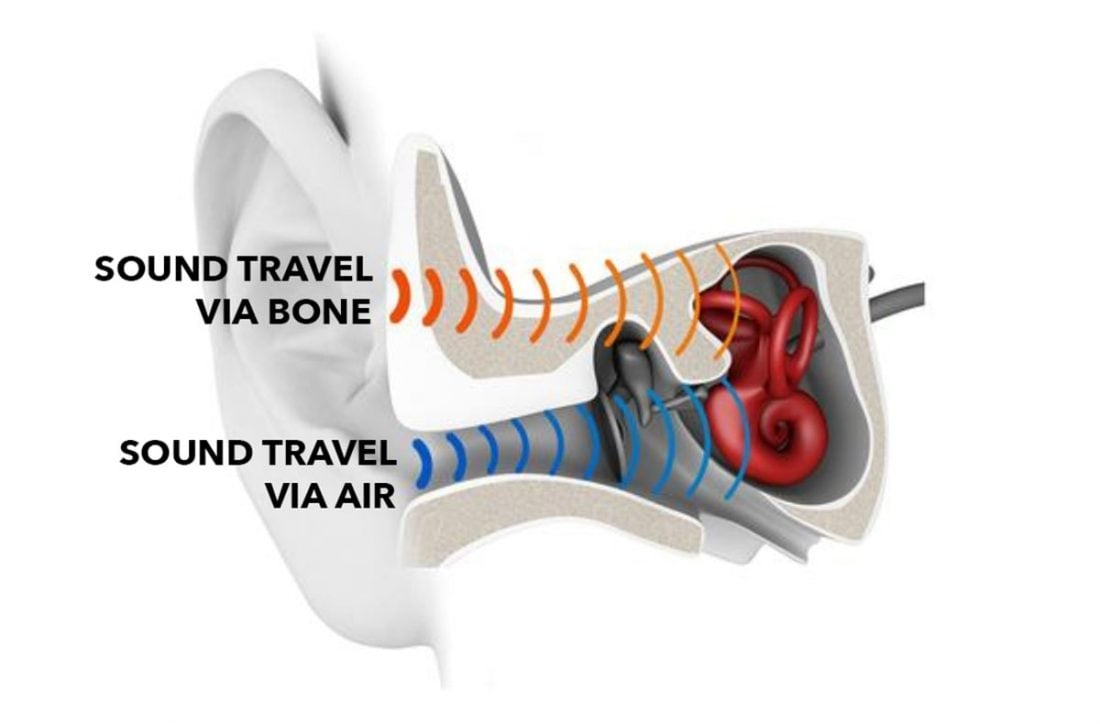Many are curious about the unique technology behind bone conduction headphones. But, there’s an on-going debate about its safety. Which side are you on?
Bone conduction headphones have been gaining popularity in recent years. With its unique open-ear design, a lot of manufacturers and advertisers promote it like it’s a godsend device to cure us of the risks of wearing headphones outdoors and headphones-related hearing loss. But others say otherwise.
Sifting through conflicting opinions can be tiring and confusing. And it’s especially frustrating when you really want to try this relatively new type of headphones as soon as possible.
If you’re one of those who are stuck between the two sides, worry no more! This article should answer all of your questions about bone conduction headphones’ safety and more. So read on!

How Do Bone Conduction Headphones Work?
Before discussing the safety of bone conduction headphones, it’s important to understand how they actually work.
For reference, the most common types of headphones use speakers, or drivers, to produce sound. Using these speakers, the sound is sent through vibrations passing through the air and into the eardrum.
Bone conduction headphones, on the other hand, use an entirely different technology.
When using bone conduction headphones, sound vibrations pass through the jaw and skull bones. From there, they travel directly into the cochlea, which sends the sounds to the brain. This means the sound by-passes other structures of the ear such as the eardrum. The sound is then heard from inside the ear, instead of outside.
So, Are Bone Conduction Headphones Safe?
Bone conduction headphones are a relatively new technology available to consumers. But bone conduction has a long history of being used for individuals experiencing certain forms of hearing loss.
In fact, it is widely rumored that Beethoven himself used this technique when experiencing hearing loss later in life. By placing a metal rod between his piano and his mouth, he would be able to hear the music through the vibrations in his mouth.
Despite its history of being used for hearing aids, it doesn’t necessarily mean they are safe or won’t cause any hearing loss, as many companies claim. As much as these companies would like to say that bone conduction is completely safe, that isn’t entirely true.
The question of headphone safety is complex. True, headphones and earbuds sometimes have a bad reputation. But whether they are safe for hearing loss or not depends largely on how you use them. The same thing can be said for bone conduction headphones.
Although there may be some distinct advantages to bone conduction headphones, they can still be unsafe when used inappropriately.
Hearing loss aside, there is one definitive way bone conduction headphones are safe. They feature an open-ear design, allowing users to hear their surroundings. This promotes safety, as it’s still possible to hear any warnings or dangers.
The final decision on whether to use bone conduction headphones is up to you. But knowing the pros and cons of these headphones can help you weigh your options and see what’s best for you.
The Case Against Bone Conduction Headphones

No product is perfect. In the case of bone conduction headphones, there are some common concerns reported by users that you should be aware of.
False advertisements
Has this ever happened to you? While reading a product description, you are blown away by its amazing features. But when you look at the reviews, they are completely different or negative. Any company trying to market a product is going to sell you on the great features. They’d be less inclined to share the possible negatives.
Some have claimed that bone conduction headphones offer no risk of hearing loss. That is simply not true. According to the CDC, the real danger of hearing loss comes from potential damage to the cochlea in the inner ear.
Sustained exposure to loud sounds can damage the hairs and nerves in the cochlea. Because bone conduction headphones still send sound to the cochlea, they can still cause hearing loss if used improperly.
Headaches and vertigo

There are certain negative side effects that have been reported when using bone conduction headphones vs normal headphones. Bone conduction headphones usually rest on your temples. Because of this, wearing bone conduction headphones can get uncomfortable or cause headaches. Some users have even reported vertigo or dizziness when using them.
These effects are mostly due to the vibrations used to transmit the sound through the cheekbones. Not all of us can get used to hearing things in a different way. Plus, as your music gets louder, the vibrations also get more intense, leaving a weird feeling on your cheekbones.
Ill-fitting headphones can also be the culprit. Discomfort can result if they don’t sit properly or put too much pressure on the head.
Nobody is the same, though, and your results and experiences are bound to be different than someone else’s. If you’re one of those who experience these problems, you may resolve them by staying at a lower volume level, and ensuring the right fit.
Skin irritation
Bone conduction headphones rest on the skin above your ears and can cause pressure. Some people experience skin irritation, often when they are worn for long periods of time.
It is to be expected that any product used or worn for an extended length of time could cause discomfort. If you’re considering using bone conduction headphones, you might want to try them out for a while to see if you experience any of these side effects.
The Case for Bone Conduction Headphones

As bone conduction headphones continue to gain in popularity and usage, there are clearly many who feel that the benefits outweigh the negatives. No wonder why there are many types of bone conduction headphones on the market today!
Help make the hearing impaired “hear”
As mentioned earlier, a unique usage of bone conduction headphones is for people experiencing certain types of hearing loss, depending on the part of the ear affected. By heading straight to the cochlea, the sound waves can skip over the areas that aren’t working properly.
Not only that, they aren’t worn directly in or on the ear. They are often more comfortable to wear when using hearing aids, and less likely to produce feedback.
Keep aware of the surroundings
How often have you been immersed in your favorite music, completely unaware that someone is trying to get your attention? It’s a common problem when you can’t hear what is going on around you.
With bone conduction headphones, though, your ears are free. You don’t need to turn off your music to know what is happening around you. Being able to stay aware of your surroundings while still listening to your music is a huge advantage of bone conduction headphones.
Great use for different professions
Many professions require both regular communication and situational awareness. Soldiers, for example, need to remain vigilant about their surroundings. Wearing earpieces can be a danger, because they may not be able to hear and react to a dangerous situation. With bone conduction headphones, they are able to maintain communication with their team while remaining safe and situationally aware.
Athletes such as runners and cyclists also benefit from the many kinds of bone conduction headphones. These outdoor sports require a certain level of awareness to keep safe. And using bone conduction headphones allows users to remain alert to their environment.
Plus, most bone conduction headphones can be worn with safety helmets and other gears. You won’t have to sacrifice anything just to upgrade your ride with some music.
Conclusion
Everyone has different tastes and experiences. Some people swear by bone conduction headphones, and others prefer to use the more traditional options available. No matter which style you prefer, protecting your hearing is important.
If you want to keep your ears safe long-term, make sure you avoid extended exposure at high volumes. This is true whether you are using traditional or bone conduction headphones.
What do you think? Do you enjoy bone conduction headphones, or are there a different type of headphones you prefer? If we missed some pros and cons of bone conduction headphones, let us know in the comments below!


I have experienced vertigo after using bone head phones .this didn’t happen when I used them before maybe it was the length of exposure
I have too been suffering with vertigo only use bone headphones for an hour at a time while running woke up this morning feeling terrible unable to move my head n eyes without spinning
Somebody in this chat is gatekeeping for the industry by claiming these products are safe, referring to it as “middle-school physics”. I suspect this entire site is industry-sponsored. Trust your bodies people, there’s no way that beaming microwave radiation into your heads will ever be safe.
There are no ways to produce microwaves in a headphone known to science….. silly idea to say otherwise
Buy quality and see what works. I have been using for two years, my airshokz are comfortable, and if I keep volume safe, my hearing is unimpaired. Too loud is too loud irrespective if the sound waves come thorugh air or bones.
If I have them on though, I am focussed on what is most engaging, so it is still easy for me to miss outside conversations with bone conductions operating. But they are hygienic and are better for running and riding. It is also nice that a neighbour cannot hear your conversations unless their ears are almost touching your ears. So they are more private.
Interestingly, if I am using them in a noisy environment they are useless unless I have ear muffs on, but you can still easily wear ear muffs or ear plugs
I have heard similar statements about negative health effects of “wearable” tech. In this case, the high frequency damage isn’t from the bone conducting hardware, but proximity of a Bluetooth transceiver that close to your brain. Studies showing effects of Wifi and Bluetooth on blood quality, blood brain barrier effects and cellular damage due to radio usage in such close proximity to the skin, bones, nerves.
Keep the volume low and don’tuse all the times. I have experienced dizziness with normal headphones as well. Just be sensible.
just got mine, after one day of use I experienced jaw pain after waking in the morning.
Love mine! Because of family with hearing loss, we can no longer have background music at home to facilitate the best hearing conditions for them. I can’t wear headphones, as I have kids with special needs as well as pets and am the only adult in the household with full hearing capabilities. Bone conduction has given me back my background music as well as let me listen to audiobooks and podcasts while still being able to hear if I am needed.
I don’t find then terribly comfortable, but I never found headphones comfortable either – overear headphones often give me headaches and in-ear headphones rarely stay in well.
Dear Editor:
I just learned about bone-conduction headphones a few days ago. I think that my cochleas might have been damaged for many years. Hence BCH may not help me. Your article greatly helped me!!! Thanks.
Jimmy Cheng
Jimmy, no problem. Glad the article was useful. Hope you can find a solution for your hearing situation.
I love the bone conduction headphones but have experienced skin irritation and itching at the headphone placement site. I’m still trying to figure this out because I love the product because I’m not tuned out to the world when wearing them.
What did you figure out? I’m having that problem. I was worried it was radiation. My wife thought it looked like a burn. I treated it and cleaned the headset with the clorox wipes. I’ll try it again tonight at work. But I’m thinking about what caused that irritation.
I wear mine almost 24/7, except when showing and sleeping and I notice irritation as well. I found that using alcohol prep pads each night before charging and thoroughly cleaning every part, I rarely have that problem now. I wear mine in a machine shop that has excessive dust and metal shavings and grease. They allow me to still wear ear plugs while using loud tools and listen to music. I’ve had mine for about 2 years now. I will never go back to regular headphones again.
I have been wearing mine a couple of times a week for three or four years now with no issues – until recently. About a month ago I started to get itchy ears after wearing them and I couldn’t understand why this might suddenly occur, but I shall try the cleaning advice and see if that helps. They are great for exercise so I wouldn’t want to have to cease using them.
Thank you for the article. It was very helpful.
I had a temporary headache the first day I used the bone conduction headphones. The day after I felt “wired”. After a week and a half of using them 1 hour a day in two 30-minute sessions, gradually increasing the bone conduction, I have had excessive tiredness, irritability, an electrical stimulation throughout my body and aggravation of my tinnitus. I am doing this in a therapy program for the brain and I love listening to the music selections! If these symptoms are connected to the headphones, though, I may have to do without them. 🙁
You’re not gonna be experiencing full-body problems from using any kind of headphones, especially not hours after using them. That’s just… not how the body works. Think about what exposure to loud noises does, and then think about potential effects of wearing something uncomfortable on your head. That’s all that *can* happen from these. The only difference with BCH is that the sound is coming in at a different point in the ear.
I bought mine the other day and I just love them. I have vertigo but haven’t had any issues thus far. I had shingles on the right side of my face neck and ear and inner ear. I can no longer wear ear buds. This product works for me.
I used to get vertigo from Meniere’s Disease but I’m in burnt out stage. I have a hearing aid in one ear and was thinking about trying these but after reading all of this, I’m a bit concerned.
Now I get noise in one ear when opening and closing my mouth. Even when I press the area in front of my ear. Kinda sounds like having water in your ear. This is when not wearing the headphones. Have used them for about two weeks. Could the headphones be the cause?
That’s quite unheard of but to be safe, discontinue the use of the BCH and see if it gets better.
I came here because my husband is experiencing that same sensation and the only thing I can think of to ‘blame’ are his bone phones. Did your problem go away after you quit using them?
I also get and underwater feeling that seems to last in my ears. But I also live in TX and am allergic to nearly every tree and grass we have here so was attributing it to something blooming.
I also have this problem, and I think it’s known as Eustachian Tube Dysfunction. It causes your ears to become blocked and it feels like you have water in your ear. Like Robin, I am also allergic to many things, which is likely what is causing that feeling. It usually resolves on its own after a few days, but mine didn’t resolve after almost a full year, so I had to see the doctor for it. I hope this is of use, but please take this with a grain of salt because this is not the only problem I have with my ears.
Hi Gladys did the eustacian tube dysfunction cause you to hear less in the ear effected while using the headphones? Thanks
Did you get it fixed i have the same problem.
Came here looking to see if anyone else has this so apparently I am not alone. I also had jaw pain on the same side as my underwater ear. I’m going to stop using them and see how long it takes to stop
I love my Aftershokz headphones and use them possibly more than I should (I love audiobooks!). My biggest question/concern is how much radiation is being emitted from these devices (jawbone) compared to other forms of wireless headphones? Any ideas which emit the smallest amount of radiation? Thank you!
there is no reason for headsets to emit harmful radiation, the specific type of radiation they may emit is weak and of a practically harmless kind.
additionally, devices sold in many countries are required to be tested to ensure they do not emit harmful radiation.
additionally, the only difference in “emission” between bone conduction headphones and other types of headphones is that these emit more intense physical vibrations.
they still use the same Bluetooth modules, the same internal electronics, and at the same distances as other headphone types.
i’d imagine the positioning would only make bone conduction safer, as all the electronics is separated from soft tissue by bone while other headphones are placed over or inside a hole in your skull.
Are there any reports that bone conduction headphones causes tinnitus. I am asking this because since the time I started using the BCH now in the last few months I have this issue. I am not sure whether BCH caused it or it has just happened on its own. I am not a audiophile too, dont listen to music all that on headphone. I use the BCH only for zoom calls and online meetings or sometimes youtube.
I experienced the same.
I never experienced Tinnitus till starting using Shokz, mainly for phone calls, and not a lot of calls at all, perhaps 15 min per day on average.
I had tinnitus before using BCH. I bought them and wore them 5+ minutes. Got dizzy. I went to bed and woke up 13 hours later. Now I have ear pain and my tinnitus is 10x worse. I am very concerned for my hearing.
While it’s normal to experience disorientation from any kind of vibrating device on the side of your head (especially one targeting the ear), this is not a normal occurrence and could not possibly be caused solely by BCH. Some of the effects sound like the aftereffects of really loud sounds, but if you weren’t listening at max volume this is doubly concerning. Seeing how long ago you posted this comment, I hope you reached out to your doctor right away.
Anecdotally, I have had tinnitus my whole life and it is not affected by my use of BCH. Of course, I hear the ringing/hissing less when they’re in use (like with any form of music) but aside from that I never experience any difference in my tinnitus from using these unless I use them at an incredibly high volume, which is something that would affect me no matter the source of the sound.
I had similar things happen to me. Use it for 30 minutes, on low volume, and suddenly I get serious tinnitus and get very sensitive to loud noises. I’ve repeated this experiment multiple times and every time it gets worse. I think for a strong minority of people, bone conduction headphones are just not safe.
What about EMF radiation?
The kind emitted by your cell phone and bluetooth devices such as BCH is incapable of penetrating the human body. Anyone who presses to say otherwise is just fearmongering, I assure you.
Well what about radiation and ear problems
The kind of radiation emitted by electronic devices IN GENERAL is incapable of penetrating the human body. These emit even less than your cell phone, as it’s just a bluetooth module and vibrating pads on the side of your head.
I’ve found (good) bone conduction headphones to be far more comfortable than any other type of headphones, and i often just keep them on for hours even if I’m not actively listening.
I’m currently using shokz openrun pro, which is pretty much the best you can get.
with other types of headphones i have a lot of issues when using them for more than a few minutes.
full size headphones often press against the ear which hurts over time, and in hot weather cause a lot of sweating.
smaller earbuds have a variety of issues.
them “anchoring” in my ears will cause pain over time, sweat flushes them out, and my ear canal on the right is a bit too big so they never form a tight fit.
as i frequently wear glasses i’m used to the pressure against my head and top of my ears, so i quickly forget they’re there.
with a thin frame it’s also not an issue to wear my glasses and headphones at the same time, although there are also options of frames for glasses with bone conduction headphones built in.
I’m blind and use BlindSquare (a talking satnav for blind people) on my phone when out and about, so BCH are a perfect solution for me. There’s no way I could use anything else as I need to be completely aware of all the sounds around me. The BCH I use are Vidonn F1, the pressure points are on my jawbone just in front of my ears and have never caused me any discomfort whatsoever, even though I often wear them for hours on end.
I love the bone conduction headphones, I have mild to moderate hearing loss in both ears… this new concept is great for me… I don’t use the headphones for listening to music. I got them to talk on my cellphone while driving or talking on the phone when I ‘m busy doing other things like cooking and talking with someone and I don’t want to hold a phone . I love them and I have adjusted my cellphone to NOT play loudly when in use. Thank you for the article.
I have a left side swannoma and im totally deaf in that ear will these help me as i cant use hearing aids in either ear
Did these work for you as i have a vestubler schawannanoma left ear and qas looking for some
Regards, Steve
I have used the Aftershokz Air version of headphones for the last two years for two reasons. First, I want to be aware of my surroundings, second, I do not want to aggravate the mild tinnitus I already experience. The headphones do have bass, but not like wearing over the ear headphones. I am constantly aware of my surroundings and can listen to music quietly as well as I carry on a conversation (a bit like having the TV on in the background). My tinnitus has not increased using the headphones. Finally, bone conduction offers the freedom to run on a road without the worry of a car silently approaching. I can privately listen to television when everyone else is asleep. The microphone picks up conversation so I have even used my bone conduction headphones for interviews because it picks up both sides of the conversation. I am definitely a fan of bone conduction headphones.
My husband’s water in the ear sounds have passed, so I suspect it was allergies too. He loves those headphones for the same reasons, he is able to be totally aware of his surroundings. It was NOT the headphones causing his water in the ear sounds as the sound has passed and he still happily wears the headphones
I run and use earbuds. When my hair gets wet (from sweat, sorry for TMI) and slaps against them, they often cut out, which is super annoying. Will BCH have any problems with a certain amount of, ah, moisture?
I saw a post from someone who wears shokz when swimming laps. That sounds pretty water proof to me.
I have been trying to find out if there is any danger associated with using BCE’S and my pacemaker? I feel like there is an arthmea that occurs when wearing my BCE’S. Has anybody else had this sensation when using BCE’S while wearing an implanted device?
Allen I use BCE’s and don’t have a pacemaker, however, I remember seeing a precaution recently about this. Please do check further into that. It may have actually been on the ZYGO website or on the user manual.
I spent my youth racing motorcycles and playing in a jazz band.
I spent my career running restaurant kitchen and lost 40%+ of my hearing in both ears. I’ve used the shokz bone conducting headphones for 6 months. I walk a lot in the mountains and these have allowed me to be totally aware of moose, bears and cyclists. I haven’t experienced dizziness or vertigo. They sent to work well for me. Thanks for the article.
What is not reviewed here is how the signals are received from the source to the headphones, presumably using the same blue tooth reception technology. Is the location of the receptor near the brain stem? Does this expose the brain the potential to accelerate brain tumour growth from the radiation of the bluetooth technology? Can this be bypassed by having a cable connection? These are safety issues that remained unanswered.
No, they’re long-since answered and very thoroughly answered. The type of radiation emitted by our electronics like bluetooth and cell phones is physically incapable of penetrating skin and is incapable of causing harm to the human body in any way. This is middle-school-level physics.
Be careful
For the first six months I was extremely impressed by the convenience and quality of bone conduction headphones especially the ones with a boom microphone
However subsequently I suspect they might have been responsible for sudden onset of Tinnitus after prolonged use and intense conversations. I have no evidence of this but I am very suspicious so I thought I would post this in case anyone else has a similar issue.
Bone-conduction does not mean that you can subject your ears to prolonged listening over 70 decibels per day. The cochlea (inner ear cavity that transposes sound waves into what your brain perceived as music or speech) can still be damaged by the prolonged exposure from any set of headphones or earbuds, bone conduction or otherwise.
I enjoy being able to have music or a book playing and still be able to hear the world around me.
I started getting tinnitus after a few months of using aftershocks. What if sound, transmitted in an unusual way through bone, destroys hair cells in the cochlea even more quickly?
That’s not how physics or the human body works. Amplitude of the sound wave (meaning, the volume of the sound) is the only determining factor in how much/how quickly your hair cells are damaged by it. While sound waves do travel more efficiently through solid materials than they do air, that more efficient travel to the cochlea will result in you hearing that sound at a louder level. Violent vibrations from sound waves can’t just pass through without you hearing them AS LOUD SOUNDS because that’s how we are able to sense volume in the first place. Which means… if it’s loud, turn it down. Just like with any other headphones.
I bought a pair of Shokz last week.. O notice I get like electric shocks from the headset and if I move them certain ways it seems very strong .. am thinking about returning .. has anyone else experienced such sensations?
Either the set you bought is damaged or defective, or what you describe as “electric shocks” is just the pads vibrating. When I wiggle mine around on my head I will feel the vibrations more or less, and that’s just because of how vibration works. If it’s on a more solid spot (meaning, a place where skin is pretty much directly on bone) you’ll feel it less as the vibrations are going through rather than out across your skin. If you move to a softer spot with more fat, you’ll feel more of the vibrations as more of it is going out and around rather than in and through. If it’s uncomfortable, try turning the volume down. Hope that helps.
I loved mine until today, the red coating melted off and burned my skin. Not bad enough to show, But enough I won’t wear them again.
Been using the same set of bch for over 2 years with no issues. My only complaint is they are falling apart due to daily use. Only one side gives sound anymore and I had to wrap some coband around one part to hold the parts together. Time for another set I think 😅
Shokz brand bone conduction honored its two-year warranty with my Airopex headphones and replaced them, when mine began to fall apart. I enjoy my headphones while watching TV, walking, or working out (boxing on a heavy bag).
How can I use this kind of headphone to help with hearing impaired?
I have had ear infection after ear infection with ‘in ear’ headphones. A co-worker introduced me to these and I have no issues at all. No pain or irritation, no headaches or vertigo and I use them 12 hours a day (I work 12 hr night shift) While everyone is different, these have been a game changer for me.
I suffer from positional Vertigo not caused by headphones , ear buds, or bone conduction. I recently found the bone conduction and here are the different ways each have worked with me.
Over the ear caused me to have migraines more frequent due to pressure placement , volume adjustment, proper to improper sizing, as well as switching between noise cancelling to transparent. It would often make my hearing feel like it was under water and I would spend days after unable to enjoy anything. As well as it would often due to pressure set off my vertigo at odd times.
In the ear head phones, I dislike these with a passion be them air pods or even the ones with the different size rubber ends , they were uncomfortable, would not stay well in my ears and the ear canal as we as the shell of my ear would become painful , I would try the smallest bud to the largest and nothing ever fit right, I would be able to wear them no longer than twenty minutes before I wanted to Yeet them as my daughter says into the nearest trash bin .
For years I had given up hoping to listen to music when I walked or went out to relax at a park , even flying and travel which upset me a lot till recently. On a recent trip with my daughter for a vacation I saw the bone conduction headphones, I had my doubts. Till my daughter pointed out that is what she had started using recently due to her doctors suggestion for her own personal reasons. I figured why not… what had I got to loose. I tried them and immediately it was a little disorienting but not because of my vertigo or headaches , it was so because I could hear clearly the music but was still able to be in touch with my surroundings. Like others I started out slow wearing them for an hour then two so on so forth building up, I did not have headaches, my skin was a little sore due to pressure the first day but it was fine the next day, now I put them on first thing in the morning before starting my routine and wear them all day, be it house chores or working. I love them and they don’t trigger my vertigo at all which has been a HUGE plus. I to clean them every night before bed and wipe them down before wearing them with the little alcohol pads you can get from most pharmacies , the ones diabetics or people who take injections would use to disinfect them. I have found after that I do not get skin irritation or issues.
Ultimately, I personally love them and enjoy getting to have music back in my life to inspire, and create, as well to work on that growing book list. I know they will not be for everyone as we all have different needs, wants and heads. Haha but if someone is like me and looking for a way to get music, books, or even the occasional MIT lecture back in their life. I suggest at least trying them .
I hope this helps !
I am a daily lap swimmer (about 30 minutes) and use a waterproof bone conduction mp3 player…recently lost hearing in my right ear only (the side of the BCD controls). I just assumed it was due to water trapped in the right ear, but it has not resolved despite using various remedies. I am planning on going to an ear M.D. soon if it does not get better…sucks not being able to hear in that ear.
I have just got a pair having read the hype and then wanting to try them.
Overall I think that they’re great! For me the key advantages are the open-ear (for keeping in touch with your surroundings – particularly if they are potentially dangerous, such as roads!), the comfort and the security of the fit (unlike ear buds you’re not going to drop/loose ’em or snag the wired type!). Mine has a built-in MP3/WAV player (from a microSD card slot) and can also handle ‘hands-free’ mobile phone calls.
Negatives? Well, you do loose some ‘low end’/bass response (as you also do with many in-ear types), although I’ve found that can be at least partly compensated for with some apps such as BlackPlayer. The output can also be ‘swamped’ by noisy surroundings of course (but – hey – that is the ‘other side’ of open-ears/surroundings awareness!).
There’s a lot of chat around about the ‘bone conduction’ technology. Having now tried them (and as an engineer) my feeling is that a fair proportion of what you hear in fact comes down your lughole in the normal way! Although not IN the ear, they do sit right adjacent to it after all! I find that the tighter I press them against my skull, the more muffled/quieter is the sound! If it was all ‘bone conduction’, surely the opposite should be true?! I’m frankly surprised not to have come across this opinion elsewhere.
Nothing in the world is perfect of course (particularly when it comes to individual opinion!), but I like ’em!
I agree. Like You, I do like them.
I have been an Auto Mechanic for over 40 years and repair most any type of machines/appliances. As a Shop owner, I wanted to use headphones with a mic for phone calls and sometimes music or variable verbal programs. I never found anything that didn’t fall off, shift around or come out of my ear, not to mention the ability to hear sounds around me. My wife handed me some open ear bone conduction headphones and said, You may like these! I was impressed. Now O wear them all day, without a hitch.